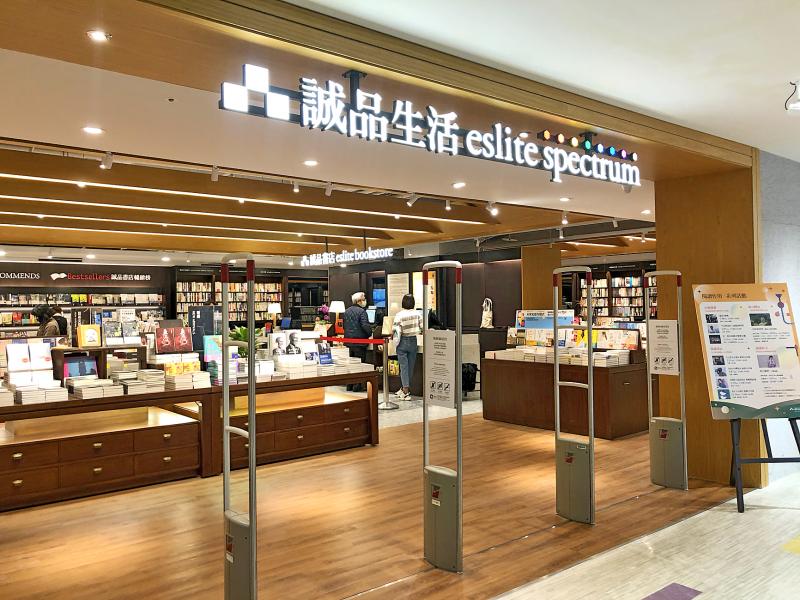Eslite Spectrum Corp (誠品生活), which runs the popular Eslite bookstore chain in Taiwan and abroad, plans to launch smaller outlets at the community level under the “eslite me-time” (誠品生活時光) brand to grow customers and sales, as the COVID-19 pandemic is reshaping consumer behavior.
The first “eslite me-time” in Taipei’s Neihu District (內湖) is smaller than 100 ping (330m2) and has a soft opening scheduled for Oct. 27 to serve an increasing number of people who prefer to shop near home to avoid COVID-19 infections, the company said.
Eslite Spectrum chairwoman Mercy Wu (吳旻潔) said that the company aims to open 300 such neighborhood bookstores within the next three years to expand its customer base, while not giving up on flagship properties.

Photo: Luo Hsin-chen, Taipei Times
The strategy would allow Eslite to extend its reach from urban central locations to communities and neighborhoods where potential customers have been underserved, Wu said, adding that the smaller-scale stores could be set up quickly in different parts of Taiwan.
The “eslite me-time” branch in Neihu would also feature a food store brand “tea room” that serves cooked meals, as well as fresh produce and fish products, the company said.
The tea room is to collaborate with a local e-commerce operators focused on farm produce to better serve customers, Eslite said.
The community bookstores seek to nurture customers’ intellectual wellbeing, while the tea room aims to take care of their physical health, the company said.
Affiliated Eslite Hotel (誠品行旅) is to take charge of cooked meals for the tea room, it said.
The company’s Web site and app will lend support to the new business, whose limited space cannot put all items available for sale on display, it said.
Eslite Spectrum has been shaking up its business model in recent years, prompted by the rise of e-commerce and the pandemic.
It has shut unprofitable properties, while planning to add new ones in more promising locations at home and in overseas markets.
Eslite is also taking a hit from social-distancing requirements and border controls as its bookstores are popular cultural attractions among foreign and domestic tourists. It operates 42 branches in Taiwan, China, Hong Kong and Japan.

Taiwan Semiconductor Manufacturing Co (TSMC, 台積電) founder Morris Chang (張忠謀) yesterday said that Intel Corp would find itself in the same predicament as it did four years ago if its board does not come up with a core business strategy. Chang made the remarks in response to reporters’ questions about the ailing US chipmaker, once an archrival of TSMC, during a news conference in Taipei for the launch of the second volume of his autobiography. Intel unexpectedly announced the immediate retirement of former chief executive officer Pat Gelsinger last week, ending his nearly four-year tenure and ending his attempts to revive the

Taiwan would remain in the same international network for carrying out cross-border payments and would not be marginalized on the world stage, despite jostling among international powers, central bank Governor Yang Chin-long (楊金龍) said yesterday. Yang made the remarks during a speech at an annual event organized by Financial Information Service Co (財金資訊), which oversees Taiwan’s banking, payment and settlement systems. “The US dollar will remain the world’s major cross-border payment tool, given its high liquidity, legality and safe-haven status,” Yang said. Russia is pushing for a new cross-border payment system and highlighted the issue during a BRICS summit in October. The existing system

Convenience store operator Lawson Inc has registered trademarks in Taiwan, sparking rumors that the Japanese chain is to enter the local market. The company on Aug. 30 filed trademarks for the names Lawson and Lawson Station, according to publicly available information from the Ministry of Economic Affairs’ Intellectual Property Office. The product categories on the application include some of Lawson’s top-selling items for use in the convenience store market. The discovery has led to speculation online that the popular Japanese chain is to enter the Taiwanese market. However, some pointed out that it might be a preemptive application to avoid others from co-opting the

Taiwan Semiconductor Manufacturing Co (TSMC, 台積電) is expected to grow its revenue by about 25 percent to a new record high next year, driven by robust demand for advanced technologies used in artificial intelligence (AI) applications and crypto mining, International Data Corp (IDC) said yesterday. That would see TSMC secure a 67 percent share of the world’s foundry market next year, from 64 percent this year, IDC senior semiconductor research manager Galen Zeng (曾冠瑋) predicted. In the broader foundry definition, TSMC would see its market share rise to 36 percent next year from 33 percent this year, he said. To address concerns